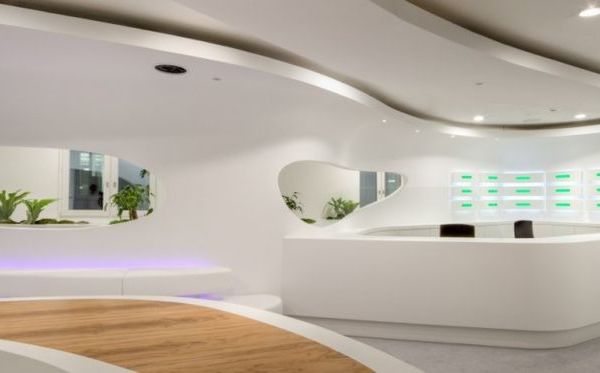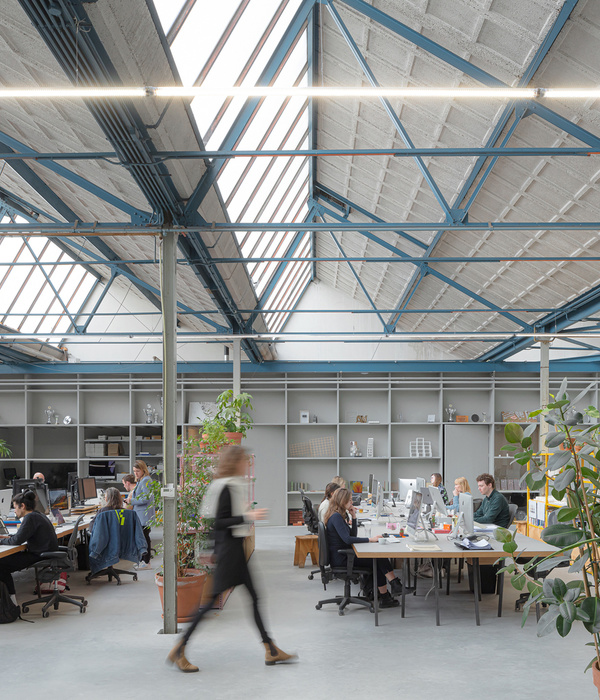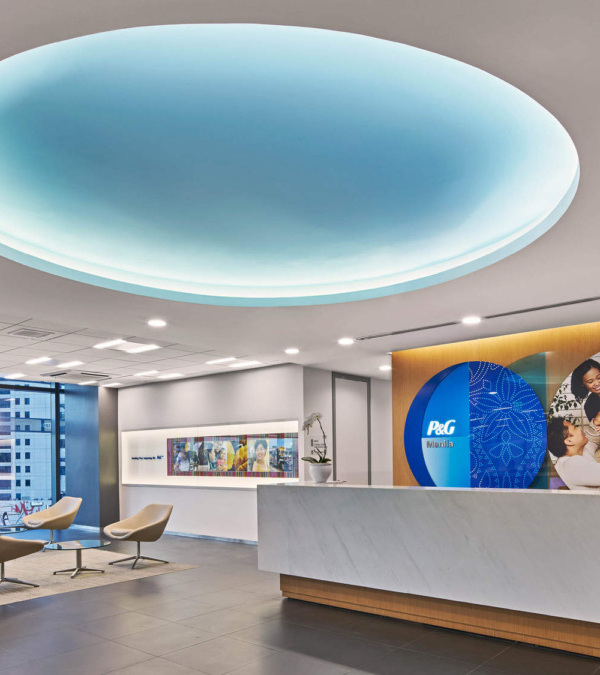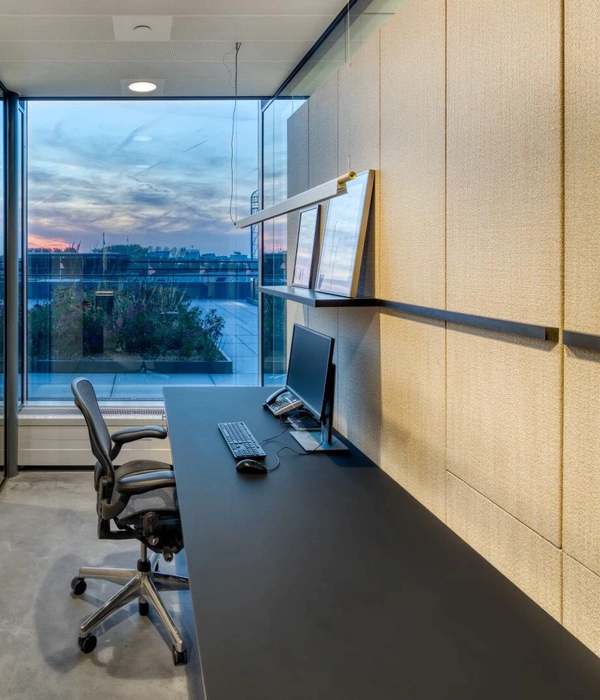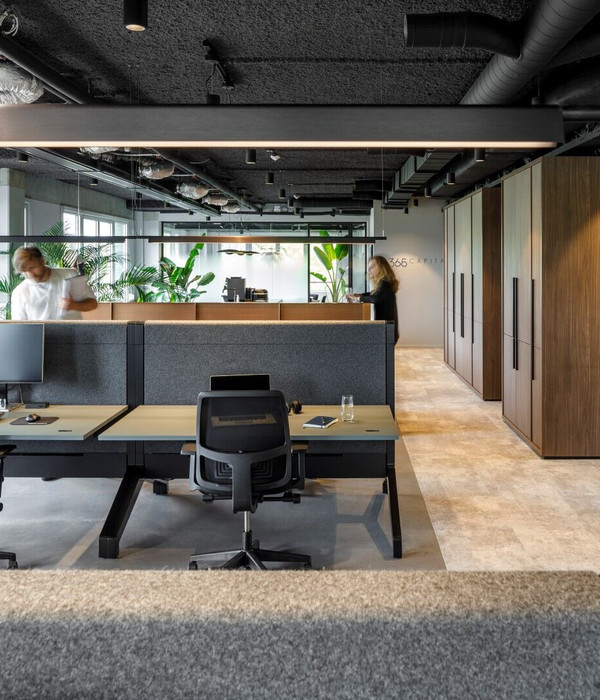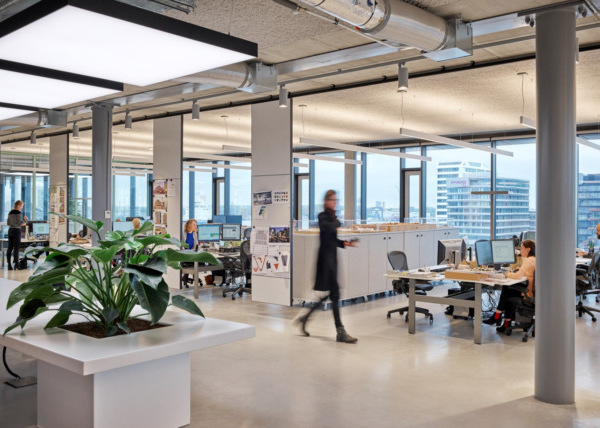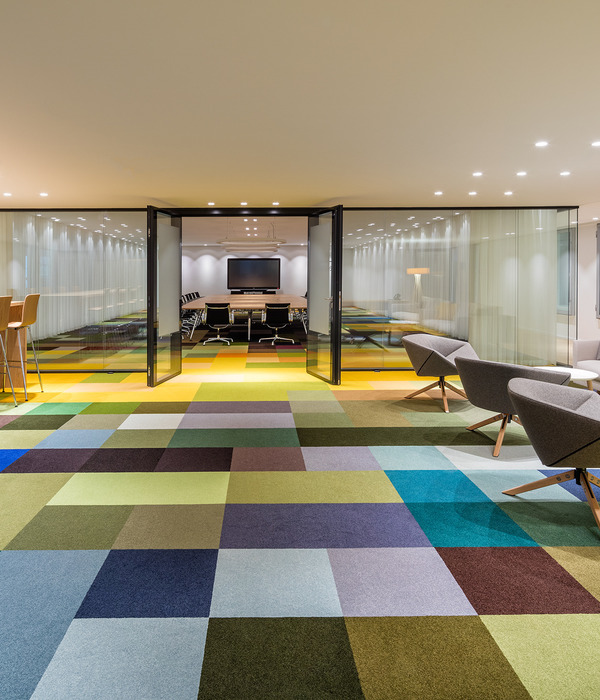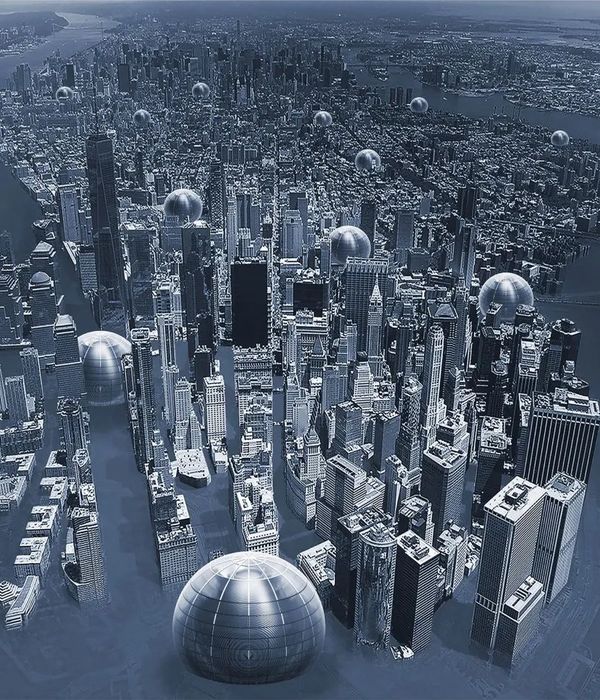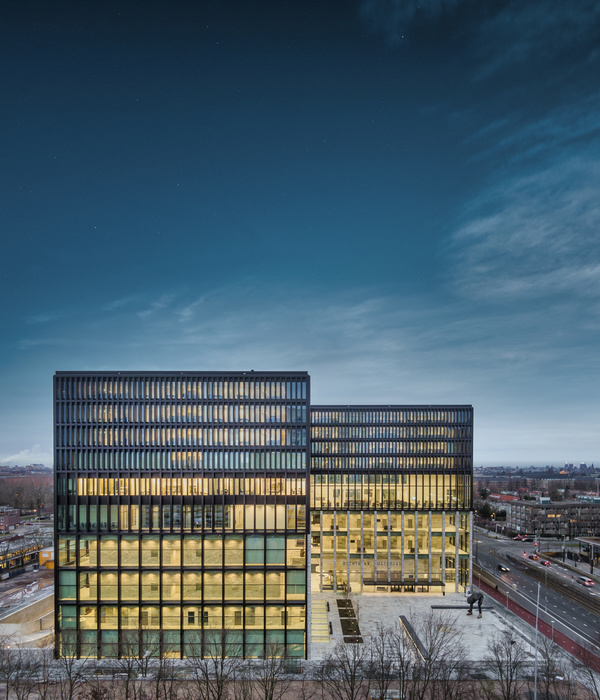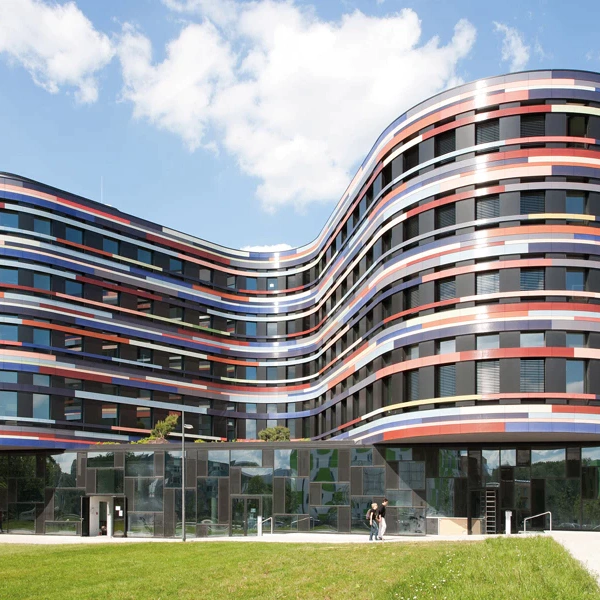- 项目名称:Feltrinelli Porta Volta 基金会总部
- 一层:主入口,自助餐厅,书店
- 二层:通高多功能空间
- 三四层:办公区
- 顶层的阅览室:为研究人员和公众提供了研究储藏在地下档案室的历史文献的机会
Porta Volta区域重要的城市维度使其总体规划具有对周边地区产生积极影响的战略潜力。Giangiacomo Feltrinelli基金会作为重塑Porta Volta区域的组成部分,其总部搬至米兰北部的中心区域,这里具有供基金会开展多种活动的理想环境。连同基金会大楼,该项目还包括另外两栋主要用于办公的建筑以及作为既有林荫道延伸的大片绿地。
The overall masterplan for Porta Volta holds an important strategic potential for creating a positive impact on the surrounding area, due to its important urban dimension. As part of the redefinition of the area Porta Volta, Fondazione Giangiacomo Feltrinelli intends to relocate its seat to the northern centre of Milan, considered as an ideal environment for the foundation’s multiple activities. Together with the building of Fondazione, the project includes the development of two further buildings, mainly dedicated to offices, and a generous green area as extensions of the existing boulevards.
▼项目外观,external view © Bahaa Ghoussainy
对场地的历史分析推动了设计方案的演变。Porta Volta区域的城市结构可以追溯至16世纪的古城墙Mura Spagnole,它是一系列城墙中的最后一道,这些城墙自罗马时期以来代表了不断扩张的城市边界。19世纪末城墙开放以后,Via Alessandro Volta大街为城市延伸至城墙外奠定了基础,将历史中心与Cimitero纪念墓园连接起来,形成崭新而显著的城市轴线。如今,这里的空旷证明了城墙的存在,也提醒人们该地区在二战中遭受的破坏。
The historical analysis of the site drove the evolution of the design proposal. The urban organization of Porta Volta traces back to the course of the Mura Spagnole, the ancient 16th century city walls which were the last of a series of fortifications which since Roman times have defined the city’s growing boundaries. After the opening of the bastion in the late 19th century, Via Alessandro Volta laid the basis for the city’s extension outside the ancient walls, connecting as a new, prominent urban axis the historical centre with Cimitero Monumentale. Today, the emptiness of the site is a testament to the walls and, at the same time, reminds one of the destructions this area has suffered during the Second World War.
▼建筑与历史环境,the building and historical context © Bahaa Ghoussainy
Porta Volta两座城门连同其他保存完好的城门为米兰城市规划提供了重要的参考点。Viale Pasubio大街的Edificio Feltrinelli和Fondazione大楼以及Viale Montello大街的Edificio Comune大楼突显出这座历史城门,延续了米兰Duomo、Piemonte和Duca D’Aosta等广场上的双建筑传统。除了保护Mura Spagnole的遗址,建筑群还集中形成宽敞的公共绿地,作为既有林荫道的延伸。新建筑的临街部分设有咖啡馆、餐厅和商店,为市民提供社交和娱乐区域。
Together with a series of preserved gates, the two Caselli Daziari di Porta Volta offer an important reference point within the Milanese city plan. The allocation of Edificio Feltrinelli and the Fondazione along Viale Pasubio and the allocation of Edificio Comune along Viale Montello underline this historical gate, taking up the Milanese tradition of twin buildings as in Piazza Duomo, Piemonte or Duca D’Aosta. Besides the preservation of the Mura Spagnole’s archaeological remains, the concentration of building mass endeavours to create a generous public green area as extensions of the existing boulevards. On the street level, the new edifices will house cafes, restaurants, and shops, offering an area for interaction and recreation to the citizens.
▼有韵律感的立面,rhythmic facade © Bahaa Ghoussainy
狭窄的缝隙将基金会大楼和相邻建筑分开,表明两栋建筑既独立又统一。
A narrow gap separates the Fondazione from the adjacent building, reflecting two autonomous constructions which are simultaneously part of an overall whole.
▼狭窄的缝隙将基金会大楼和相邻建筑分开 © Bahaa Ghoussainy the narrow gap separates the Fondazione from the adjacent building
▼两栋建筑既独立又统一 © Bahaa Ghoussainy the two buildings are independent and unified
▼近景,closer view © Bahaa Ghoussainy
▼缝隙内部,inside view © Bahaa Ghoussainy
基金会一层设有主入口、自助餐厅和书店,二层是通高多功能空间,三四层均为办公区。顶层的阅览室为研究人员和公众提供了研究储藏在地下档案室的历史文献的机会。
The ground floor of the Fondazione accommodates the main entrance, cafeteria and book store, followed by the double height multi-functional space on the first floor, and an office area on both the third and fourth floors. The reading room on top of the Fondazione offers researchers and interested public the opportunity to study documents from the historical collection stored in the secure underground archive.
▼多功能空间,the multi-functional space © Bahaa Ghoussainy
▼墙壁上的展品,exhibits on the wall © Bahaa Ghoussainy
▼明亮的通高空间,bright height space © Bahaa Ghoussainy
▼落地玻璃引入自然光 © Bahaa Ghoussainy the floor-to-ceiling glass brings natural light into the room
▼多功能空间一角,corner of the multi-functional space © Bahaa Ghoussainy
▼旋转楼梯,spiral staircase © Bahaa Ghoussainy
▼楼梯内部,inside view © Bahaa Ghoussainy
新建筑的灵感来自米兰建筑Ospedale Maggiore医院、Rotonda della Besana建筑群、Lazaretto教堂以及Castello Sforzesco城堡的质朴与宏大尺度,同时也受到伦巴第细长的卡西纳传统乡村建筑的影响,这也是阿尔多·罗西作品中的重要参考,例如他在加拉雷兹地区的住宅项目。设计师因此设计出狭长的建筑,以隐晦的象征方式引入融于立面的屋顶。不同屋顶结构通过扭转,体现出场地的几何条件,在透明性和空间感之间达到平衡,使立面、结构和空间形成统一的整体。
The new buildings are inspired by the simplicity and generous scale of historic Milanese architecture as Ospedale Maggiore, Rotonda della Besana, Lazaretto and Castello Sforzesco. They are also inspired by the long, linear Cascina buildings of traditional rural architecture in Lombardy, which already were an important reference in Aldo Rossi’s work, for instance his residential building in Gallaratese. This is why we propose an elongated and narrow architecture which in a vaguely figurative way introduces a roof which melts into the facades. The structure expresses the geometrical conditions of the site in a rotation of its members and balances between transparency and spatial definition. Façade, structure and space form an integrated whole.
▼阅览室,the reading room © Bahaa Ghoussainy
▼柔和的光环境,the environment with soft lighting © Bahaa Ghoussainy
▼书架空间利用,the space utilization of bookshelves © Bahaa Ghoussainy
▼小礼堂,the small auditorium © Bahaa Ghoussainy
▼从礼堂望向室外 © Bahaa Ghoussainy view to the outside from the auditorium
对Porta Volta区域的重塑本质上是一个米兰项目,它以米兰城市和建筑为主题,在历史进程中创造出一系列著名的标志性建筑。
The redefinition of Porta Volta will intrinsically be a Milanese Project, taking up themes of Milanese urbanism and architecture, which through the course of history have led to a series of emblematic buildings for which the City of Milan is renowned.
▼结构细部,details of the structure © Bahaa Ghoussainy
▼家居细部,details of the furniture © Bahaa Ghoussainy
{{item.text_origin}}

